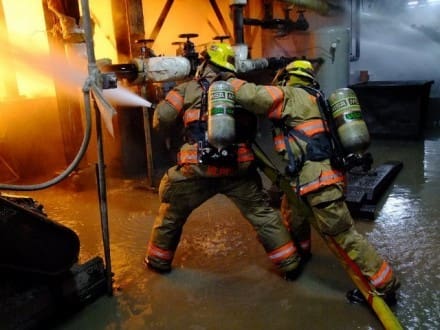Recently I had a good friend go through a serious health crisis. This is a buddy that I’ve known since the 2nd grade and when I joined the Marine Corps, he became a firefighter. As I came up the ranks, he did also. Eventually he became a Battalion Chief in our city’s fire dept. Now my friend was an athlete in HS, but as he got older he rarely did any serious PT, nor did he watch his weight. He wasn’t a smoker, or seriously overweight, but one day not to long ago he went in for some minor chest pains and it was found that he had a seriously damaged heart value. In fact it was so serious, that he had to immediately have major open heart surgery and was medically retired from the fire dept. Within a few weeks, his career as a firefighter was over at age 54.
His family had no known history of this type of problem, but sadly his occupation does. When I was doing research for my book “Corps Strength”, I consulted many friends I had in Law Enforcement and Firefighters about their physical fitness needs, and I was surprised to find out that more firefighters died on duty from heart attacks than from any other reason. The life of a firefighter is hard, not just in the fact that they may be burned, suffocated or have a structure fall on them, but from the irregular work shift and sleep patterns, and the constant instant stress (alarm mentality) when responding to fire calls. If you combine that with being out of shape over many years, can cause serious physical issues, like my friend is dealing with now. I’m not a doctor, and I’m not trying to preach like one. However I do believe that a simple, consistent routine of balanced physical training, and a good diet of healthy foods goes a long way to preventing these problems. Exercise is a proven stress reliever and we know its positive effect on maintaining a healthy weight and heart.
My friend had successful surgery and is now slowly on the mend, however he could have easily become a statistic. His doctor told him that if he hadn’t come in for a checkup when he did, he would have probably been on a fire call and then without warning, suffered a massive heart attack and died on the spot. My friend and all other 1st Responders spend their lives helping others, but the bottom line is they also need to take some time taking care of themselves. After everything they do for us, they deserve it. Be safe always, good when you can.
Semper Fi
MGunz
Tags: Corps Strength



Very good points, I spent 23 years as a cop (8 years in the Army also) and although I did not exercise the first several years of my career, I have had a pretty steady routine for the last 17 years. I am 51 now and in pretty decent shape, though I did develop significant sleeping issues which I would attribute to work, same reasons; constantly changing shifts, constant hot calls, getting called out in the middle of the night for years and the constant wear of dealing with folks that want to bash your head in worse. There are good reasons first responders and military have 20 year retirements and to see congress try to diminish the military retirement system is outrageous.
Amen. This is a huge issue for Fire/Rescue. Our department only recently instituted mandatory physicals (which may have saved my life, though not for a fitness issue), much against the protestations of the lifetime members who were terrified they’d be medically retired against their will.
The problem is that most departments lack a fitness culture. The food is heavy, the stress is high and the sleep is interrupted. Time between calls is often spent on the couch (or if you’re an EMS guy like me, writing reports). Food and sleep are even worse for EMS officers, since they tend to have a higher call volume (85%+ of the calls in our region) and grab quick (and thus, unhealthy) meals whenever possible.
I would love to see real cultural change be driven into the EMS provider population, with an emphasis on functional fitness. It will keep us happier, healthier, safer and able to work longer.